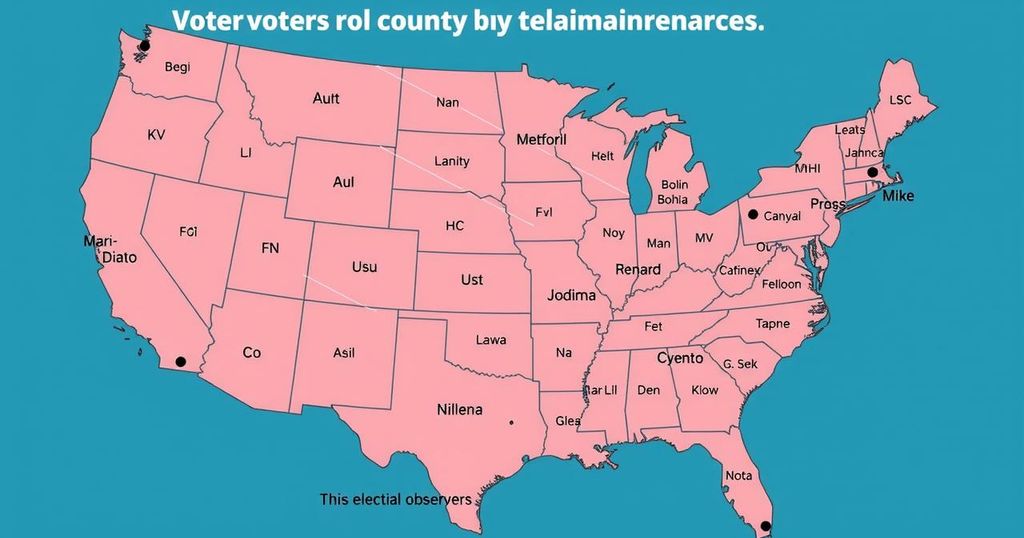World news
AFRICA, ALLEN, AUSTIN, BEAVER, BURKINA FASO, CIVIL RIGHTS, DEBORAH AUSTIN, DELAWARE, DELAWARE COUNTY, ELECTION, ELECTION RESEARCH INSTITUTE, EUROPE, HEATHER HONEY, HONEY, JIM ALLEN, JORDAN WILKIE, KAREN DISALVO, LEGISLATION, NORTH AMERICA, NORTHAMPTON, PA, PA FAIR ELECTIONS, PRESIDENTIAL ELECTION 2024, UNITED KINGDOM, UNITED STATES, WIT, WITF, WITF ACTIVISTS
Stella Nguyen
0 Comments
Pennsylvania Counties Conduct Voter Roll Maintenance Amid Controversy
Pennsylvania counties have removed nearly 12,000 voters from registration lists, which activists attribute to their work, while officials state that the removals are part of routine maintenance required by law. Despite concerns raised by groups like PA Fair Elections regarding voter integrity, election officials maintain that current practices comply with legal obligations and are necessary for maintaining accurate voter rolls.
In recent weeks, activists who have campaigned to remove voters from Pennsylvania’s registration lists have praised the removal of nearly 12,000 ineligible voters. However, county election officials attribute these removals to routine post-election voter roll maintenance mandated by law. Despite claims from groups like PA Fair Elections, election officials clarify that their actions align with state and federal regulations rather than external pressures from these organizations.
For instance, Jim Allen, elections director for Delaware County, stated, “I’m glad they consider us restoring their confidence, but at the same time, we never did anything to take away from their confidence,” reinforcing the notion that the cleaning process is standard practice following federal elections.
The process of maintaining voter registration involves multiple steps to ensure compliance with the National Voter Registration Act of 1993, which permits the removal of voters deemed inactive after two federal election cycles. Although groups advocating for stricter voter roll management claim existing measures are insufficient, officials maintain that the current protocols are both lawful and efficient. Colin Sisk, Beaver County’s election director, explained, “Because that’s the timeline, the removal process kind of naturally occurs after a general election.”
The involvement of PA Fair Elections in attempting to challenge mail-in ballots for military and overseas voters has also been noted. Meanwhile, Deborah Austin, an activist associated with the group, shared a report celebrating the voter roll removals, even as county officials reiterated that such actions should not be credited to outside agencies. The divergence in perspectives highlights ongoing tensions surrounding election integrity and management in Pennsylvania.
As the November election approaches, counties prepare for potential disruptions caused by alleged misinformation campaigns that could mislead voters regarding their registration status. Election officials, including Bethany Salzarulo from Cumberland County, have expressed concern over a rise in inquiries from registered voters in response to advocacy groups’ mailings, which contributed to confusion rather than constructive election administration.
Amid these developments, it becomes increasingly essential for voters to understand the legal framework surrounding voter registration and the importance of accurate and well-maintained rolls, especially in a politically charged environment.
Discussions surrounding voter integrity continue to evolve. While activists like Austin celebrate their achievements, officials remain steadfast in their commitment to lawful maintenance of voter rolls. The upcoming election will serve as a critical test of both the regulatory framework and public trust in the electoral process in Pennsylvania.
The article discusses the ongoing efforts to clean up voter rolls in Pennsylvania, amidst claims of election integrity concerns. Following the 2020 presidential election, several groups, particularly PA Fair Elections, have protested against perceived irregularities in the voter registration process. Each election cycle, counties are obligated to purge inactive voters from their lists, a lawful procedure adhering to federal regulations established in the National Voter Registration Act of 1993. As the November election looms, the narrative surrounding voter registration integrity remains a contentious issue, reflecting broader national debates on election security.
In summary, the efforts to cleanse voter rolls in Pennsylvania have sparked a divide between election officials and advocacy groups. While activists claim responsibility for the removals, officials maintain that these actions are standard procedure governed by federal law. As confusion grows among voters, the importance of clarity in the electoral process has never been more paramount. The handling of voter registration will continue to be a focal point in the electoral narrative leading up to the November 2024 election.
Original Source: www.witf.org




Post Comment